新目标八年级下英语第六单元教案(2014版)
- 格式:doc
- 大小:58.50 KB
- 文档页数:7
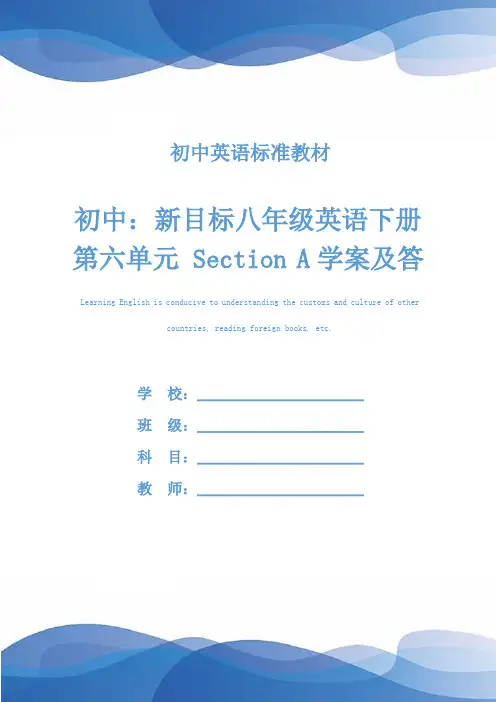
初中英语标准教材初中:新目标八年级英语下册第六单元 Section A学案及答Learning English is conducive to understanding the customs and culture of othercountries, reading foreign books, etc.学校:______________________班级:______________________科目:______________________教师:______________________--- 专业教学设计系列下载即可用 ---初中:新目标八年级英语下册第六单元Section A学案及答案(教学方案)新目标八年级英语下册第六单元 section a学案及答案unit 6 how long have you been collecting shells?section a学习目标知识目标:1.单词 collect , shell, skate, pair, since, raise, several, skater2.掌握句型:how long have you been skating?i’ve been skating for five hours.i’ve been skating since nine hours.i’ve been skating since iwas seven years old.--how long did you skate? --i skated for two hours.--what sport do you play? --tennis.--when did you start? --when i was eleven.能力目标:通过学习现在完成进行时,学会谈论人们做某事持续多长时间,谈论人们收藏某物多长时间。
情感目标:通过对历史文化知识的再认识,培养学生跨学科学习的能力。
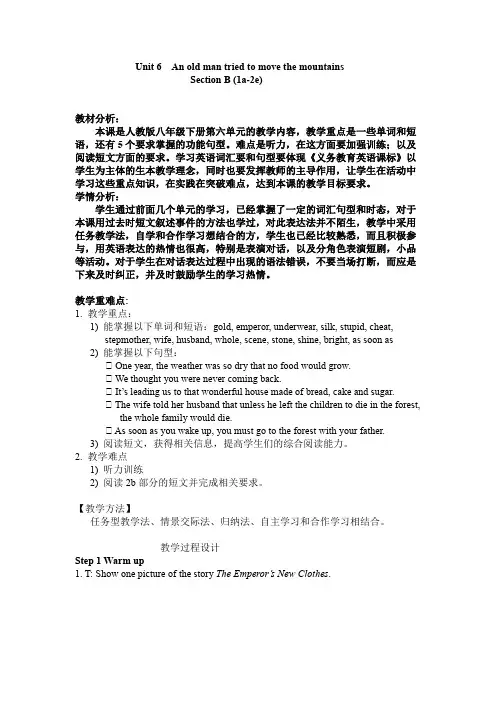
Unit 6 An old man tried to move the mountainsSection B (1a-2e)教材分析:本课是人教版八年级下册第六单元的教学内容,教学重点是一些单词和短语,还有5个要求掌握的功能句型。
难点是听力,在这方面要加强训练;以及阅读短文方面的要求。
学习英语词汇要和句型要体现《义务教育英语课标》以学生为主体的生本教学理念,同时也要发挥教师的主导作用,让学生在活动中学习这些重点知识,在实践在突破难点,达到本课的教学目标要求。
学情分析:学生通过前面几个单元的学习,已经掌握了一定的词汇句型和时态,对于本课用过去时短文叙述事件的方法也学过,对此表达法并不陌生,教学中采用任务教学法,自学和合作学习想结合的方,学生也已经比较熟悉,而且积极参与,用英语表达的热情也很高,特别是表演对话,以及分角色表演短剧,小品等活动。
对于学生在对话表达过程中出现的语法错误,不要当场打断,而应是下来及时纠正,并及时鼓励学生的学习热情。
教学重难点:1. 教学重点:1) 能掌握以下单词和短语:gold, emperor, underwear, silk, stupid, cheat,stepmother, wife, husband, whole, scene, stone, shine, bright, as soon as2) 能掌握以下句型:① One year, the weather was so dry that no food would grow.② We thought you were never coming back.③It’s leading us to that wonderful house made of bread, cake and sugar.④ The wife told her husband that unless he left the children to die in the forest,the whole family would die.⑤ As soon as you wake up, you must go to the forest with your father.3) 阅读短文,获得相关信息,提高学生们的综合阅读能力。
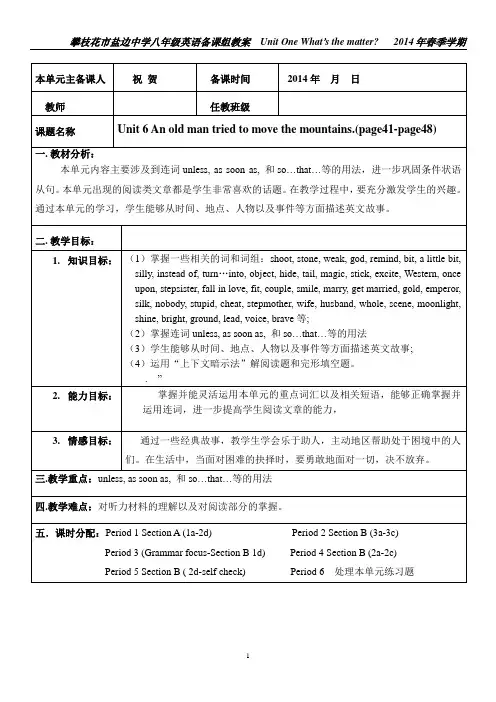
Period 1 Section A (1a-2d)一、教学目标:1. 语言知识目标:1) 能掌握以下单词以及短语:shoot, stone, weak, god, remind, bit, a little bit, silly, instead of.2) 能熟悉以下句型:What do you think about…?I think it’s a little bit…As soon as the man finished…2. 情感态度价值观目标:引导学生只要尽心尽力去做一件事情,一定会有所收获。
二、教学重难点1. 教学重点:掌握相关的单词和词组,并能够灵活运用。
As soon as the man finished talking, Yu Gong said that his family could continue to move to the mountains after he died.2. 教学难点:学生对听力材料中新句型、新词组的理解。
此外,as soon as的用法也是本节课的难点。
三、教学过程Step1 Greet the whole class as usual. And then learn new words and phrases.Step2 1a Match the story titles with the pictures on page 41.知识点归纳:try是动词,意为“试图,设法”如:我正设法算出这道数学题。
动词try还表示“试”、“尝试”,“试用”你试过种药了吗?拓展:try搭配的词组:try to do sth设法做某事;try on试穿;try out尝试,实验;try one’s best尽全力;have a try试一下。
随手练:⑴明天我将尽量早来。
⑵他还没有试穿过这件毛衣。
⑶我们的老师总是尝试一些新的想法。
⑷Lucy将尽力赶上其他同学。
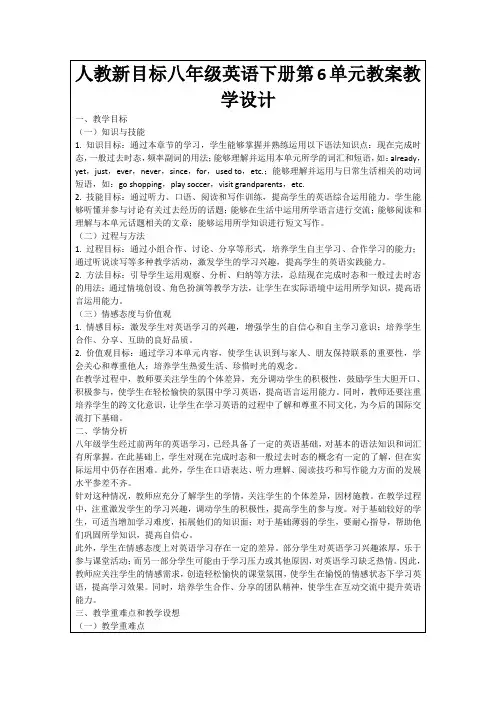
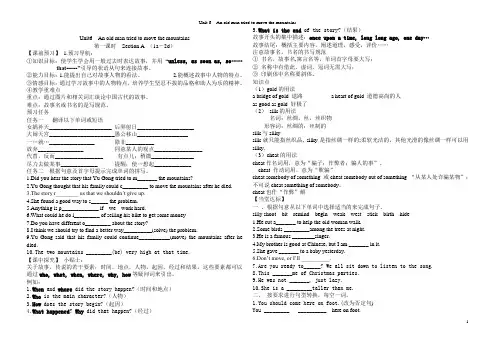
Unit6 An old man tried to move the mountains第一课时Section A (1a-2d)【课前预习】 1.预习导航:①知识目标:使学生学会用一般过去时表达故事,并用“unless, as soon as, so……that……”引导的状语从句来连接故事。
②能力目标:1.能提出自己对故事人物的看法。
2.能概述故事中人物的特点。
③情感目标:通过学习故事中的人物特点,培养学生坚忍不拔的品格和助人为乐的精神。
④教学重难点重点:通过图片和相关词汇谈论中国古代的故事。
难点:故事名或书名的是写规范。
预习任务任务一翻译以下单词或短语女娲补天______________________ 后羿射日____________________大闹天宫_______________________愚公移山__________________一…就…________________ 除非__________放弃________________ 同意某人的观点_________________代替,反而_________________ 有点儿;稍微_______________尽力去做某事_____________ 提醒;使…想起_____________任务二根据句意及首字母提示完成单词的拼写。
1.Did you hear the story that Yu Gong tried to m_______ the mountains?2.Yu Gong thought that his family could c_________ to move the mountains after he died.3.The story r________ us that we shouldn’t give up.4.She found a good way to s______ the problem.5.Anything is p_____________ if we work hard.6.What could he do i_________ of selling his bike to get some money7.Do you have different o_________ about the story?8.I think we should try to find a better way__________(solve) the problem.9.Yu Gong said that his family could continue___________(move) the mountains after he died.10.The two mountains _________(be) very high at that time.【课中探究】小贴士:关于故事,传说的若干要素:时间,地点,人物,起因,经过和结果。
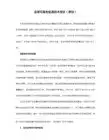
八年级英语下册Unit 6教案设计(新目标)八年级英语下册Unit6教案设计(新目标)一、教学内容及分析本单元围绕“谈论人们做某事持续多长时间”和“谈论人们的业余爱好”这两个话题,设计了相关的语言情境。
SetinA1a-2首先以图画开篇,图画介绍了本单元的语言目标,即现在完成进行时的用法,然后设计了听力活动、俩俩对话活动以及小组活动,从听说角度训练了本单元的核心句型。
在GraarFus中归纳总结了现在完成进行时和一般过去时。
SetinA3a-4提供了运用现在完成进行时所进行的读、写、说的一系列练习,进一步强化了这一语法项目。
SetinB1a-2b 先通过填写“自己收集的物品”和“希望收集的物品”,呈现了听力活动中所要用到的词汇;然后设计了两个听力活动,分别从两个层面,从宏观到细节,帮助学生掌握现在完成进行时的意义,结构和用法。
2-4b设计的活动,则通过说、读、写的活动,谈论人们的业余爱好以及谈论收藏某物多长时间,对现在完成进行时态的运用能力进行了综合训练,旨在帮助学生创造性的掌握运用现在完成进行时态的能力。
Selfhe部分让学生通过活动1、2对自己的词汇运用能力及语言综合运用能力进行自我评价。
后阅读介绍了一位名叫利奥的澳大利亚人在中国黑龙江省哈尔滨边任教边学中国历史的经历,表达了对中国身后的感情。
本单元主要语言功能项目是谈论人们做某事持续多长时间,语法结构为Hlnghaveubeending?和Hlngdidud?根据新改的理念:教育要以人为本,促进人的发展,要关注学生,关注过程,关注发展。
而要体现这个基本理念,就需要合理的使用教材,合理的整合教材,所以我把SetinA1b,1,2a,2b,2,GraarFus做为第一时;3a,3b,4为第二时;SetinB1a,2a,2b,2,3a,3b,4a为三时;Selfhe为第四时;Reading为第五时。
既遵循了学生的认知水平,又符合学生的学习心理。
二、学习者特征分析初二的学生已有一定的语言基本功,比如:-hth’surhbb?-Ilie…-hatsprtdupla?–hendidustart?等句型都已学过,在这基础之上再去学习新的目标语言,这样能够激发学生的学习欲望,从而乐于参与语言实践活动,为英语学习营造良好的堂学习氛围,为完成教学目标奠定了良好的基础。
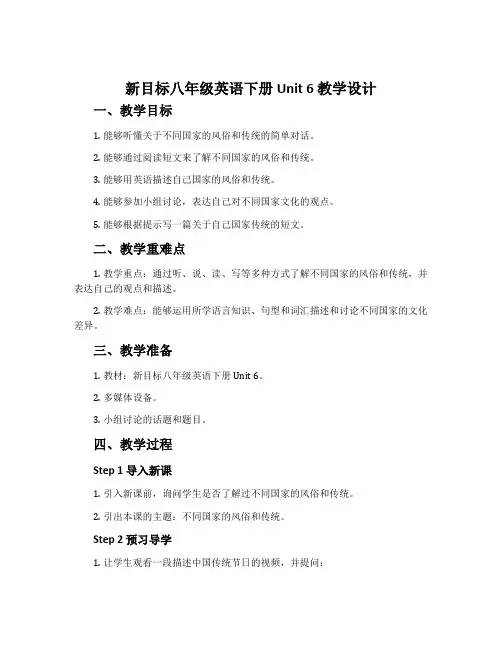
新目标八年级英语下册 Unit 6 教学设计一、教学目标1.能够听懂关于不同国家的风俗和传统的简单对话。
2.能够通过阅读短文来了解不同国家的风俗和传统。
3.能够用英语描述自己国家的风俗和传统。
4.能够参加小组讨论,表达自己对不同国家文化的观点。
5.能够根据提示写一篇关于自己国家传统的短文。
二、教学重难点1.教学重点:通过听、说、读、写等多种方式了解不同国家的风俗和传统,并表达自己的观点和描述。
2.教学难点:能够运用所学语言知识、句型和词汇描述和讨论不同国家的文化差异。
三、教学准备1.教材:新目标八年级英语下册 Unit 6。
2.多媒体设备。
3.小组讨论的话题和题目。
四、教学过程Step 1 导入新课1.引入新课前,询问学生是否了解过不同国家的风俗和传统。
2.引出本课的主题:不同国家的风俗和传统。
Step 2 预习导学1.让学生观看一段描述中国传统节日的视频,并提问:–What festival is it about?–How do Chinese people celebrate it?2.学生讨论问题并给出答案。
3.教师搜集学生的回答,写在黑板上。
4.提醒学生观察和回答问题时要用英语。
Step 3 新课呈现1.展示一个包含不同国家风俗和传统的幻灯片,并向学生描述每个国家的特点。
2.通过问答的方式与学生互动,引导他们了解不同国家的文化差异。
Step 4 听力训练1.放一段录音,让学生听对话,选择正确的答案。
2.听完录音后,学生与同桌讨论并给出答案。
3.教师与学生核对答案,并给予反馈。
Step 5 阅读训练1.学生阅读一篇关于日本传统节日的短文。
2.学生独立回答与短文相关的问题,并将答案写在答题卡上。
3.教师检查学生的答案,并给予反馈。
Step 6 口语训练1.学生分组进行小组讨论,针对不同国家的风俗和传统进行讨论。
2.教师设定话题并提供问题指导学生讨论,鼓励学生表达个人的观点和看法。
Step 7 写作训练1.学生根据提示写一篇关于自己所在国家传统的短文。
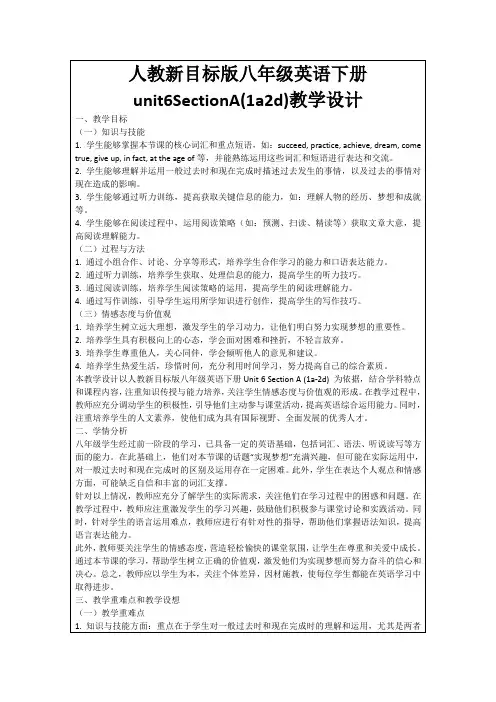
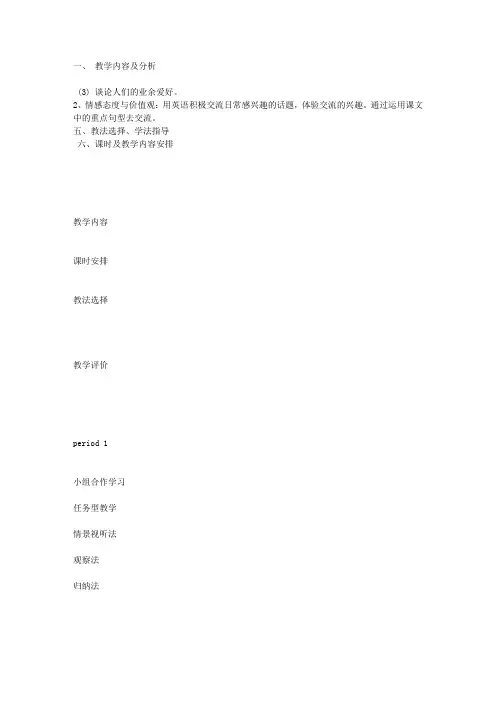
一、教学内容及分析(3) 谈论人们的业余爱好。
2、情感态度与价值观:用英语积极交流日常感兴趣的话题,体验交流的兴趣。
通过运用课文中的重点句型去交流。
五、教法选择、学法指导六、课时及教学内容安排教学内容课时安排教法选择教学评价period 1小组合作学习任务型教学情景视听法观察法归纳法观察提问激励period 2 任务型教学阅读法小组对话激励提问period 3 任务型教学阅读法写作法提问谈话period 4 任务型教学写作训练练习法独立作业相互交流reading period5 任务型教学阅读法提问激励教学内容课时period 1教学对象八年级学生执教者一、教材内容分析二、教学目标(知识,能力,情感态度、价值观)三、重点难点4.初步感悟现在完成进行时态的意义和结构。
四、教法选择、学法指导六、教学过程教学任务教师活动学生活动设计意图step1lead-in(3minutes)1greetthestudents.2 lead-in通过学生回答熟悉的问题导入新课,出示新的语言目标。
(1o minutes)利用图片,在语境中学习单词,初步感悟语言目标。
step3listening( 6minutes)2.students only listen the first time.通过听力再现语言目标,加深对语言目标的理解。
(10minutes)1.为学生提供了一个用目标语言去交际的机会(注意人称的变化)。
2.归纳现在完成时态的结构:have\has +been+doingstep5listening(6mintes)2.students only listen the first time.通过听力又现语言目标,并为下一环节的语言操练作铺垫。
(7mintes)2.利用flash 让学生再次感悟现在完成时态意义,从而让学生试着去归纳现在完成时态概念。
(3minutes)1. summarize:今天我们学习了什么时态?它的结构是什么?2. 用目标语言去谈论你喜欢的运动。
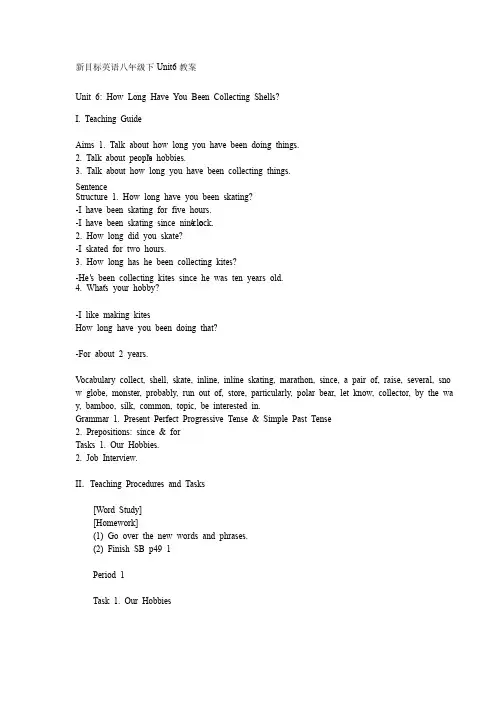
新目标英语八年级下Unit6教案教案Unit 6: How Long Have You Been Collecting Shells? I. Teaching Guide Aims 1. Talk about how long you have been doing things. 2. Talk about people's hobbies. 3. Talk about how long you have been collecting things. Sentence Structure 1. How long have you been skating? -I have been skating for five hours. 'clock. -I have been skating since nine o2. How long did you skate? -I skated for two hours. 3. How long has he been collecting kites? -He's been collecting kites since he was ten years old. 4. What's your hobby? -I like making kites How long have you been doing that? -For about 2 years. V ocabulary collect, shell, skate, inline, inline skating, marathon, since, a pair of, raise, several, sno w globe, monster, probably, run out of, store, particularly, polar bear, let know, collector, by the wa y, bamboo, silk, common, topic, be interested in. Grammar 1. Present Perfect Progressive Tense & Simple Past Tense 2. Prepositions: since & for Tasks 1. Our Hobbies. 2. Job Interview. II.Teaching Procedures and Tasks [Word Study] [Homework] (1) Go over the new words and phrases. (2) Finish SB p49 1 Period 1 Task 1. Our Hobbies 1. Lead-in: Show Ss some pictures about people's collections. Then ask them to talk about what they collect. Fill in the table on P 47. And then have a discussion in pairs. I collect... Reasons I would like to collect... shells they are beautiful stamps they are interesting e.g.: I collect shells because they are beautiful. I’d like to collect stamps because they are interesting…2. Listening p 47. 2a, 2b. 3. “The Student Union is going to set up many clubs. They are doing an investigation on students ' hobbies. They want to see want kind of clubs students like to join. Please fill in the investigation form in pairs.”Name Hobby How long Last Time How long Tom play basketball for 3 years yesterday 1 hour Anna dance for 7 years last Sunday 2 hour Jerry swim for 4 years last week 50 minutes e.g. What's your name? What is your hobby? How long have you been playing basketball? -I have been playing basketball for about ten years. How long did you play it yesterday? -I played it for about two hours. 4. Give a report. e.g.: My name is Peter. I have been living in China for about seven years. I like collecting stamps. I have been collecting Chinese stamps since I came to China. I have been collecting over three hun dred Chinese stamps. I like Monkey King stamps best. 5. Grammar Focus: The difference between “since” and “for”The skating marathon has been going for eight hours. I have been collecting kites for seven years. He has been watching English movies since 1998. I have been listening to music videos since I was seven years old. for: (prep) 表示时间的持续,后面加时间段,表示一段时间,多与带数词的名次连用,其谓表示时间的持续,后面加时间段,表示一段时间,多与带数词的名次连用,其谓语需用延续性动词。
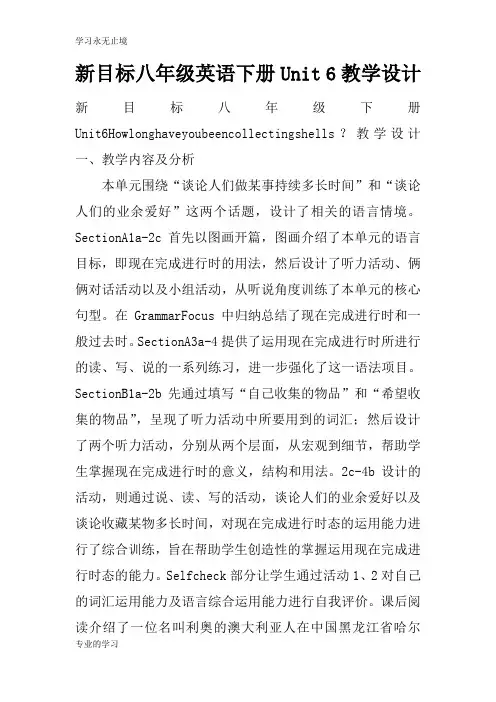
新目标八年级英语下册Unit 6教学设计新目标八年级下册Unit6Howlonghaveyoubeencollectingshells?教学设计一、教学内容及分析本单元围绕“谈论人们做某事持续多长时间”和“谈论人们的业余爱好”这两个话题,设计了相关的语言情境。
SectionA1a-2c首先以图画开篇,图画介绍了本单元的语言目标,即现在完成进行时的用法,然后设计了听力活动、俩俩对话活动以及小组活动,从听说角度训练了本单元的核心句型。
在GrammarFocus中归纳总结了现在完成进行时和一般过去时。
SectionA3a-4提供了运用现在完成进行时所进行的读、写、说的一系列练习,进一步强化了这一语法项目。
SectionB1a-2b先通过填写“自己收集的物品”和“希望收集的物品”,呈现了听力活动中所要用到的词汇;然后设计了两个听力活动,分别从两个层面,从宏观到细节,帮助学生掌握现在完成进行时的意义,结构和用法。
2c-4b设计的活动,则通过说、读、写的活动,谈论人们的业余爱好以及谈论收藏某物多长时间,对现在完成进行时态的运用能力进行了综合训练,旨在帮助学生创造性的掌握运用现在完成进行时态的能力。
Selfcheck部分让学生通过活动1、2对自己的词汇运用能力及语言综合运用能力进行自我评价。
课后阅读介绍了一位名叫利奥的澳大利亚人在中国黑龙江省哈尔滨边任教边学中国历史的经历,表达了对中国身后的感情。
本单元主要语言功能项目是谈论人们做某事持续多长时间,语法结构为Howlonghaveyoubeendoing...?和Howlongdidyoudo...?根据新课改的理念:教育要以人为本,促进人的发展,要关注学生,关注过程,关注发展。
而要体现这个基本理念,就需要合理的使用教材,合理的整合教材,所以我把SectionA1b,1c,2a,2b,2c,GrammarFocus做为第一课时;3a,3b,4为第二课时;SectionB1a,2a,2b,2c,3a,3b,4a 为三课时;Selfcheck为第四课时;Reading为第五课时。
Unit 6 An old man tried to move the mountains.第一课时Section A (1)一自主学习1. (1)预习Page4l页词汇(2)能熟练运用描绘身体部位的词汇。
(3)学生明确学习目标(4)质疑释疑1.An old man tried to move the mountains.try是动词,意为“试图,设法”如:我正设法算出这道数学题动词try还表示‘轼”、“尝试”,‘轼用”你试过种药了吗?拓展:try搭配的词组:try to do sth设法做某事;try on试穿;try out尝试1实验:try one's best尽全力;have a try试一下随手练:(1)明天我将尽量早来(2)他还没有试穿过这件毛衣(3)我们的老师总是尝试一些新的想法(4)Lucy将尽力赶上其他同学。
(5)让我试下2与how有关的短语:how big多大、how far多远、how soon多久、how long多长、how often多少一次、how wide多宽、how many\much多少(1)这条街多宽?(2)你妈妈多久回来?(3)从车站到超市多远?3. In 1972, it was discovered that they are endangered. 1972年,人们发现它们已经濒于灭绝was discovered是一般过去时的被动语态,discover"发现”,近义词为find和~at【友情链接】discover, invent与findOdiscover指发现过去所不知道的东西,新奇或意外的东西Coal was fast discovered and used in China.中国首先发现并使用了煤Columbus discovered America on the 12th of October, 1492. 1492年10.12日,哥伦布发现美洲。
invent意为“发明”,即创造出以前从未存在过的东西。
Edison invented the electric lamp爱迪生发明了电灯·Radio had just been invented thenJR时无线电刚刚发明出来. find意为“找到”,侧重于找到过去丢失的人或物,但有时也表示凭经验或偶然发现了一种东西Today, corn is found all over the world.今天,全世界都有了玉米.She found him a very good pupil.她发现他是个非常好的学生。
@有时find和discover可以互相替代,意思相同。
His notebook was found/discovered in the desk.他的笔记本是在课桌里找到的。
4.Some of the swamps have become polluted.一些沼泽地受到了污染have become polluted中的become是连系动词,polluted是过去分词这种“系动词+过去分词”结构,意思上也接近被动语态。
The slodier got wounded(接近were wounded)in the battle.这几名战士在这场战斗中受了伤A few minutes later, the ground became/was covered with snow.几分钟后地上尽是雪5.1'm like this animal because I am strong and intelligent.I like water,and I like to eat vegetables.我像这种动物因为我有强壮又聪明。
我喜欢水,我喜欢吃蔬菜。
be工ike像look like看起来像like sth.:ff欢某物like to do sth.喜欢做某事like sb. To do sth.喜欢某人做某事(五)当堂检测I.单项选择:()1.There used to be river in front of the city, ?A.did it edn't it C.didn't thereD.did there()2.Let's turn the radio down.Your father .Ais sleeping B.slept C.sleepsD.is sleep()3.-Where is Bob?一He to the library." going B.has been C.wentD.has gone()4.Another zoo in the city .A.built B.has builtC.is being built D.will being built()5.How long may I your bike ?AlendB.boxrow C.keep D.get()6.The animals are made in the zoo.A.five B.to fiveC.living D.to living()7.1 don't know when he ,but if he ,I'll call you.Axomes,comes B.will come, comes es,will come D.will come,will come用所给动词的适当形式填空。
1.Knives are (use)to cut things.2.The children were told that the am (rise)in the east.3.Sundenly I realized someone (follow)me.4.He's lived here since he (come)to the city.5.He likes ane—(—go) swimming with him this afternoon.五.课后反思:第二课时SectionA (H)(一)自主学习:掌握单词remind god weak instead of hide magic(二)质疑释疑1. against介词必须和b。
或其它动词一起用,表示“与..…对抗”Our school played against K High School at baseballWe are for peace and against war.2, visit及物动词,名词是visitor也可用作名词,表示参观.访问.常构成词组make a visit to......(参观,访问)be on a visit to......(正在参观j访问中)go on a visit to......(去访问,去参观)This is my first visit to Beijing. Mr. Brown is on a visit to China.3. Keep的用法,keep doing sth.意思是继续不断的做某事,一直做某事. The baby kept crying until his mother came back. keep其他用法(1). keep+adj.意思是保持某种状态You must keep quiet in the library.(2). keep+sb/sth+表地点的介词短语。
意思是让某人一直在某地,you'd better keep the chicken in the fridge.(3). Keep sb,/sth.from doing sth.意思是防止某N某物做某事.The policemen kept the children form crossing the road when it was dangerous.(4). Keep on doing sth.意思是反复做某事.Don't keep on shouting at me.3.They provide homes for many endangered animals.他们为许多濒临灭绝动物提供家园…provide是及物动词,意为‘呢供”,“供给”表示“提供.人……物件”是provide... with·;‘提供……给……人”是provide for....The school provides us with all the materials we need.学校提供我们所需要的一切资料。
We are provided with everything we need for work我们被提供了工作所需要的一切The school provides all the books we need for us.学校为我们提供我们需要的书籍【友情提示1@provide for是“供养”的意思He has a large family to provide for.他要养活一个大家庭·4. and help to educate the public about caring for them.(P 120)并且帮助教育公众关爱它们·care for表示“喜欢”,“关心”之意,后接名词或v_ing形式作宾语,take care of也有这个意思。
He cared nothing for skating.他对滑冰没有兴趣In our class, we care for each othe〔在我们班上,我们相互关心Maria takes good care of everybody.玛丽亚很关心大家【友情链接1 care for还可以表示“照顾”,“照粉,,相当于take care of或look after.At night he fed and cared for the cattle.夜里他照料牲口,给牲口喂食。
You must care for yourselves.=You must look after yourselves.你们要照顾好自己The Alldren are well cared for in the nurseries.=The children are taken good care of in the nurseries.孩子们在托儿所受到很好的照顾。
(三).当堂检测I.从方框中选择适当的单词,并用其正确的形式填入句子中。
有些选项是多余的1.Many people are worried about the_ animals.2.Have you ever— a zoo before?3.1 don't think zoos are_ places for animals to live.4.Tigers and some dangerous animals_ in cages in the zoo.5.11's necessary the zoo.6.Azoo is a textbook for us.7.This TV program_ people to protect the environment.8.Some large animals can move in the cage.1I.根据句意和首字母提示,完成句中单词.1.It's dangerous for animals to drink if the water becomes p2.Some animals are g and friendly to people.3.The animal weighs about 200 p4.This is a habitat that has never been d by people.5.Do you know the r why they didn't come?6.The nose of the elephant is about two meters 17.Zoos are places of great p for some endangered animals. III.句型转换1.Some endangered animals are looked after in the zoo.(改为同义句)Some endangered animals are of in the zoo.2.People are trying to save the manatees .(对画线部分提问)are people trying?III, seems that Polar Bears are gentle animals.(改为同义句)Polar Bears seems gentle animals.四·课后反思第三课时SectionB (1)(一).自主学习L熟读课文并理解文章内容2.学生明确学习目标(二)质疑释疑Lturn offthe shower while you are washing your hair. (P121)洗头的时候关掉淋浴·(1) turn off表示“关掉”,用在关掉收音机,煤气,自来水等场合。